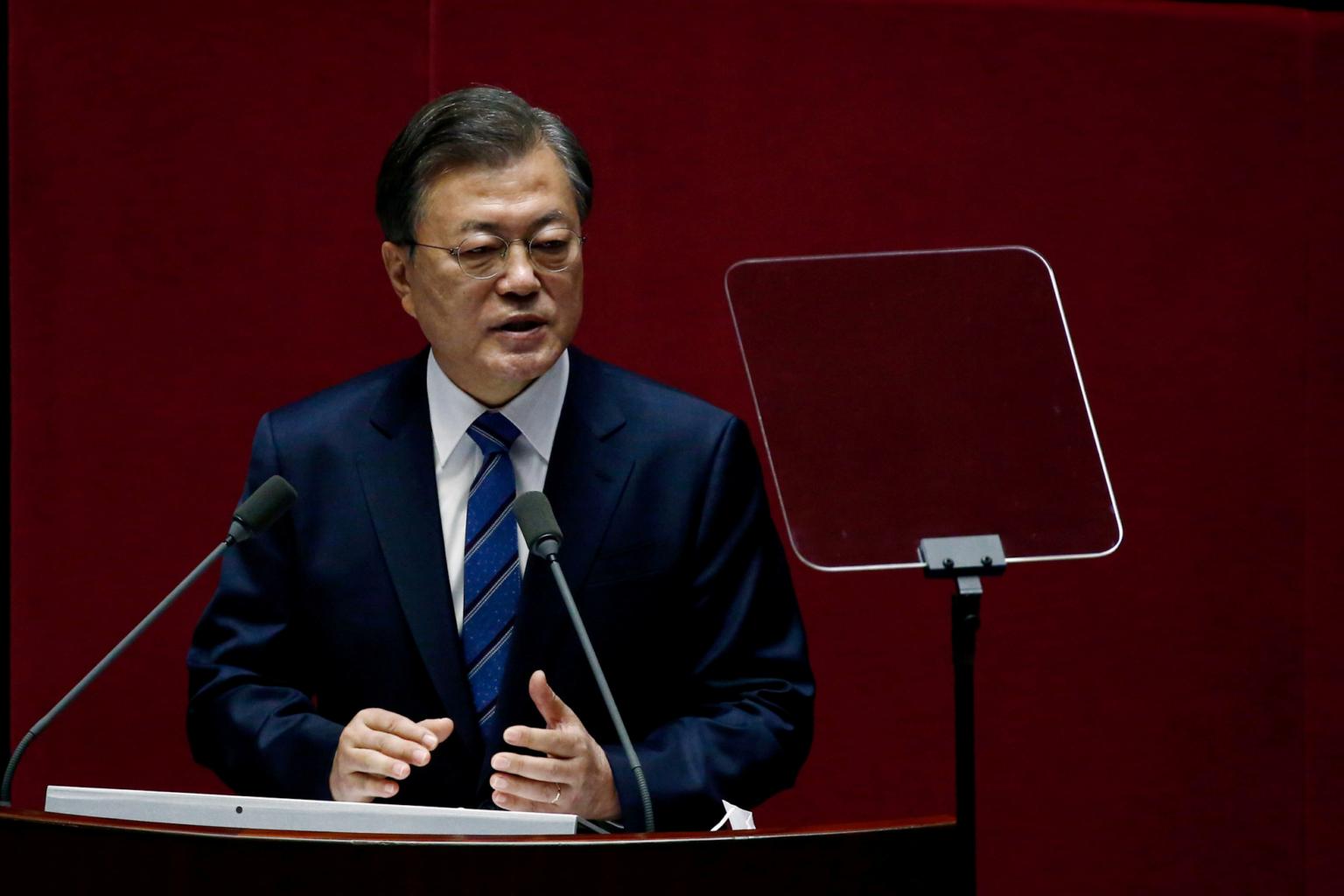President Moon facing tough election fight in South Korea's biggest cities
Sign up now: Get insights on Asia's fast-moving developments

The sliding poll numbers come after Mr Moon Jae-in and his allies scored a supermajority in parliamentary elections about a year ago.
PHOTO: REUTERS
Follow topic:
SEOUL (BLOOMBERG) - President Moon Jae-in's Democratic Party could be headed for its biggest defeat in five years in mayoral elections on Wednesday (April 7) in South Korea's two biggest cities, a troubling sign for his progressive bloc just 11 months ahead of a presidential vote.
Surveys show conservatives with commanding leads in by-elections in Seoul and Busan, fuelled by public anger over real estate prices in major cities that have soared under Mr Moon. Polls are open from 6am to 8pm.
Losses in the cities that account for about a quarter of South Korea's population could slam the brakes on Mr Moon's agenda to increase public employment and a push for larger fiscal spending.
It would also serve as warning to his Democratic Party that it needs to revamp its policies if it wants to keep the presidency when Mr Moon's single, five-year term ends in 2022.
In Seoul, Oh Se-hoon, a former mayor running as the candidate for the conservative opposition, was the choice of 50.5 per cent of respondents while Democratic candidate Park Young-sun, a former minister for startups, was at 28.2 per cent, in a survey by Korea Research International, IPSOS and Hankook Research released a week ago, before the official blackout period.
In Busan, Park Hyung-jun of the conservative People Power Party was well ahead of Kim Young-choon from Mr Moon's progressive party, according to a separate survey conducted by the three institutions.
Mr Oh, also backed by the PPP, has hammered Mr Moon's government for tightening regulations on redevelopment and limiting the number of building permits over the years, saying the attempt to rein in gains by private constructors have backfired.
Mr Oh resigned as Seoul mayor in 2011 having lost a fight to curb free student lunches in the capital to reduce public spending, stoking criticism of being tight-fisted. A return to power could signal public sentiment has soured towards Mr Moon's economic policies that prioritise wealth redistribution and fiscal aid.
Ms Park has also shown her unhappiness with Mr Moon's real-estate policy and distanced herself from the president.
"If the PPP wins, Moon possibly becomes a lame duck and swing voters may further jump on the bandwagon of the People Power Party over the next few months," according to Shin Yul, a political science professor at Myongji University in Seoul.
Mr Moon pledged to make housing more affordable when he was elected in 2017, but apartment prices in Seoul have doubled in the last five years, while South Korean salaries have risen less than 20%, leaving housing in the capital out of reach for many people and some of it in the hands of a speculative few.
Amid the anger over housing, Mr Moon's support rate hit a new low last week, following allegations employees of a state-run land corporation used insider information to make money for themselves from housing developments in Seoul. The scandal was the latest in a series of questionable land deals that have dogged the Moon presidency.
The sliding poll numbers come after Mr Moon and his allies scored a supermajority in parliamentary elections about a year ago, riding a wave of public support for their management of the coronavirus crisis. Mr Moon's party has scored a series of victories in the wake of the 2016 impeachment of former President Park Geun-hye, a conservative leader later convicted of corruption.
The by-elections were needed after the mayors in Seoul and Busan, both from Mr Moon's Democratic Party, faced allegations of sexual harassment, an embarrassment for Mr Moon who has billed himself as a feminist president.

